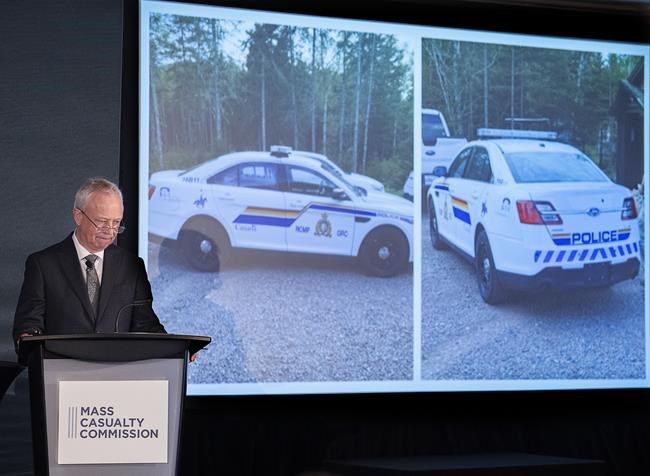OTTAWA — Almost two years after the RCMP imposed a moratorium on the sale of its decommissioned vehicles, the police force has released an internal audit that uncovered a series of shortcomings.
The report was written in response to two cases of people in Nova Scotia using former RCMP vehicles to impersonate police officers, including the April 2020 mass shooting that killed 22 people.
"The safety of the public and of police officers rests in part on being able to differentiate between an active RCMP police vehicle and a vehicle that has been made to look like an RCMP police vehicle," the report says.
The review, dated July 2022, found there was inconsistent evidence in RCMP files to prove vehicles had been fully decommissioned before their sale by GCSurplus, the federal disposal authority.Â
As well, the review found that some of the vehicles sold through GCSurplus had some markings and equipment that could identify them as former law enforcement vehicles. And there was no official agreement between the RCMP and GCSurplus for the removal of decals.
The review team also discovered there was no national list of equipment and markings required to be removed from decommissioned vehicles.Â
Although decommissioning is addressed in RCMP manuals, the review found that the technical aspects of removing equipment and decals were not documented.
"If controls are not working as intended, there is a ... reputational risk to the RCMP if improperly decommissioned vehicles are misused after sale," the report says. "Based on interviews ... the decommissioning process varies across the force."
The report calls for better cost tracking and improved oversight of the process.
In response, the RCMP's chief financial officer, Jen O'Donoughue, agreed with the review's findings and acknowledged there are opportunities to strengthen decommissioning standards and controls, the report says.
Meanwhile, enhanced inspections have been developed and an independent firm has been contracted to determine how police agencies in Canada dispose of vehicles and to identify best practices.
According to the report, the RCMP has the largest law enforcement fleet in North America, consisting of about 12,000 on-road vehicles, 1,500 of which are decommissioned every year.Â
On April 18-19, 2020, a man disguised as a Mountie fatally shot 22 people in Nova Scotia during a 13-hour rampage. For most of that time, he was driving a decommissioned police car that he had modified to look exactly like a marked cruiser, complete with an emergency light bar and reflective decals.
In January 2021, then-public safety minister Bill Blair suspended the sale of decommissioned RCMP vehicles two days after another man in Nova Scotia was arrested for allegedly impersonating an officer while driving a vehicle that was altered to look like an unmarked police car.
Two months later, the RCMP's national fleet management told GCSurplus to do a better job of removing markings, which included grinding off reflective markings on vehicles headed for the scrapyard.
And in April 2021, Nova Scotia passed a law to prevent the use, possession, sale and fabrication of police articles, uniforms, vehicle markings and police vehicle equipment.
The audit focused on the decommissioning of light-duty policing vehicles including pursuit vehicles and special service vehicles from Jan. 1, 2018, to Dec. 31, 2020. Thirty disposed vehicles were assessed for compliance with the rules.
Of the 27 vehicles that were sold, 19 had decals removed by GCSurplus. None of the files, however, had evidence to indicate the RCMP had verified the decals were completely removed before the vehicles were advertised for sale.
— By Michael MacDonald in Halifax.
This report by The Canadian Press was first published Oct. 25, 2022.
The Canadian Press



